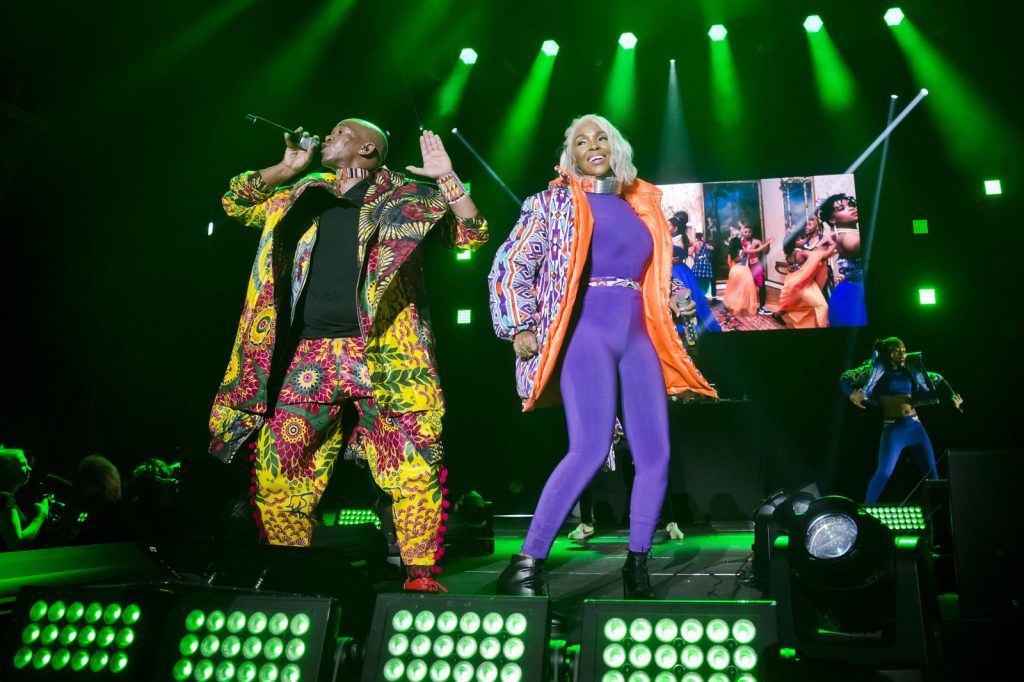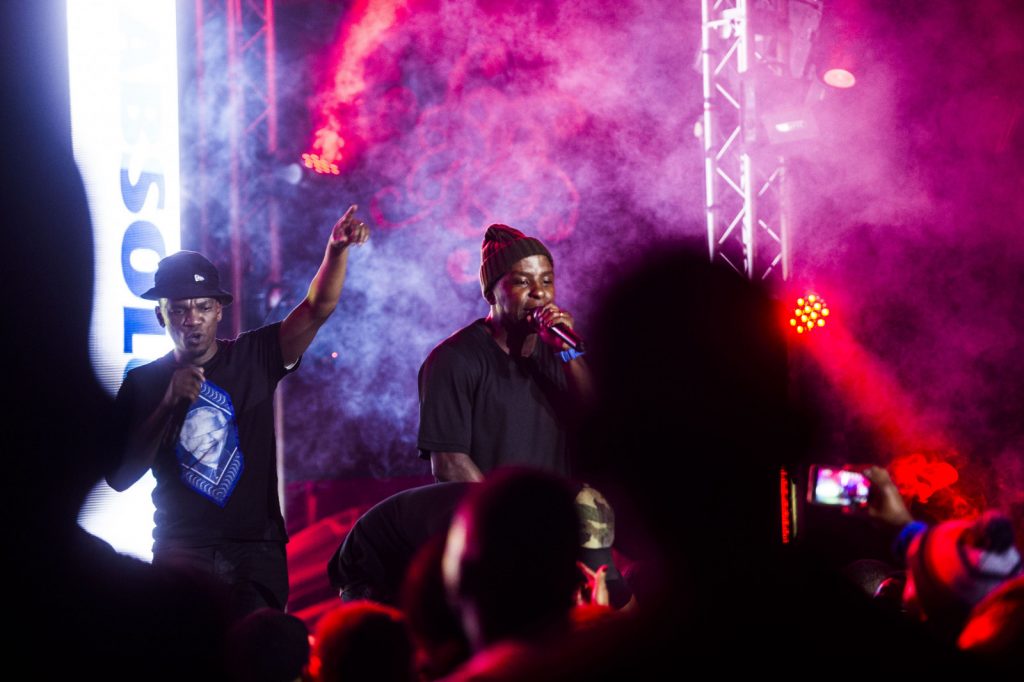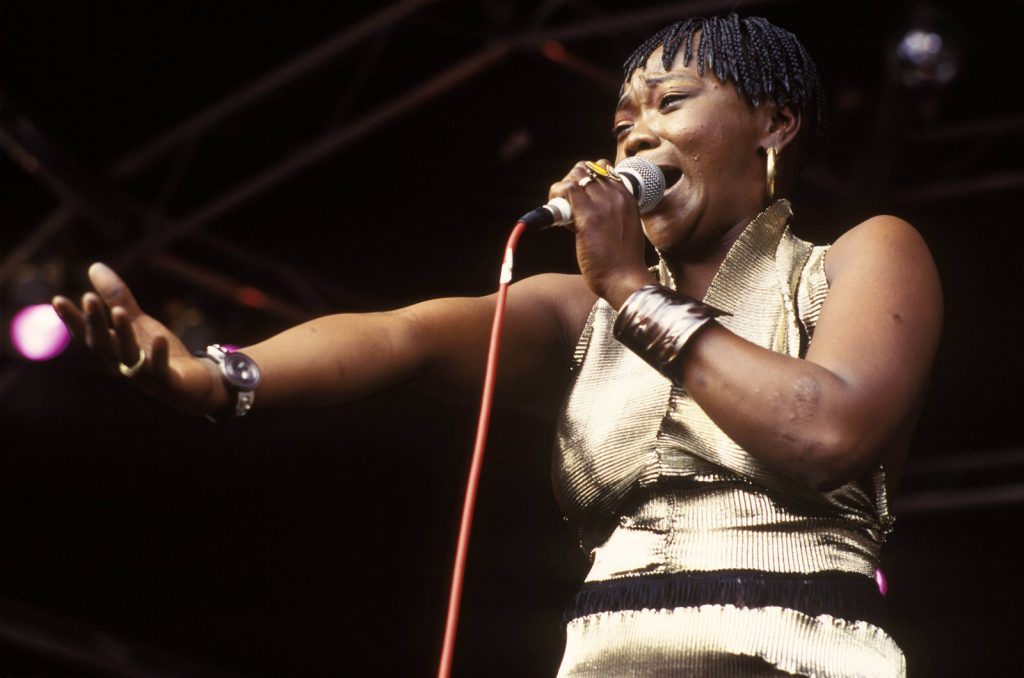Take note: Francois van Coke, who holds the record for most wins in the Best Rock Album category, with Fokof-polisiekar. (Charl Pretorius/Gallo Images)
This year marks 27 years since the recording industry of South Africa first celebrated local musicians in the form of the South African Music Awards (Samas). South Africa’s music history goes back significantly further than 1995, but that the awards started a year into our democracy means the Samas reflect a timeline of postapartheid music history.
After two years of virtual events, the awards return this year to their de facto home, the Sun City Superbowl. Zakes Bantwini leads the pack of nominees with a total of seven nominations, driven in large part to his success with hit single Osama.
The Awards have seen some crazy moments. In 1995, when the awards launched at the Alberton City Hall of all places, Brenda Fassie won Best Female Artist, and Arthur Mafokate mimicked anal sex live on stage in protest of the absence of a dedicated kwaito award. TKZee would eventually take home two kwaito awards in 1999.
Combing through the winners’ lists from 1995 to 2021, it becomes clear how music has both changed and stayed the same. While award shows don’t necessarily reflect the zeitgeist, what the Samas lists reveal makes for an interesting discussion about where music in South Africa might be going.
Which artist holds the record for the most wins in one night? Mafikizolo is a good guess and the right answer. They swept up a staggering 12 Sama awards in 2014. They also hold the record for most repeat wins in an artist category having won the Best Duo or Group award five times between 2003 and 2018.
Mafikizolo’s success comes down to their unique insight into the lived experience of black people, who make up the majority of people in this country. Sibongile launched their careers in 2002, and hits like Ndihamba Nawe became a staple of wedding celebrations. The hits kept on coming, with songs like South Africa’s national love song, Emlanjeni in 2005 and even more recently in 2019 with Ngeke Balunge.
 The music of Theo Kgosinkwe and Nhlanhla Nciza of Mafikizolo reflects their insight into the lived experience of black South Africans. (Frank Hoensch/Getty Images)
The music of Theo Kgosinkwe and Nhlanhla Nciza of Mafikizolo reflects their insight into the lived experience of black South Africans. (Frank Hoensch/Getty Images)
But what say the people? Just ask Zahara, Mlindo the Vocalist, and Joyous Celebration, the only three artists to be honoured with the Best Selling Album/Artist award twice. Zahara’s hits Loliwe and Phendula became instant earworms across the nation. Mlindo the Vocalist’s Amablesser and Macala found similar success by telling stories that people can relate to — like losing your girl to a blesser and wanting to have a good time on a night out. And Joyous Celebration has mastered the art of packaging the black church experience into audiovisual formats fans can’t get enough of.
The South African black experience continues to be immortalised in local music and people respond to it. That’s why songs like 1999’s Song of the Year, Vul’indlela by Brenda Fassie, enjoy apparently immortal staying power.
Most of the music mentioned so far is music young people can comfortably enjoy with their parents and grandparents. But there’s a party culture in this country that demands something way more expressive. Enter gqom and amapiano.
Gqom and amapiano appear to have emerged around the early 2010s. In the absence of an Arthur to perform sex acts on stage, both genres were only recognised at the Samas for the first time in 2019 and, at the time, in a joint category. Meanwhile, artists such as DJ Lag and Musa Keys have taken these genres across the country and to the world, and they’re actively shaping what South African music sounds like because of this. Both genres enjoy dedicated global playlists on Apple Music and Spotify and if you’ve been to any club worth its salt, you’ll know that many young people identify with these sounds on a spiritual level.
Since the Samas started allowing everyday South Africans to vote for Record of the Year in 2009, the award has gone to a house track five times, including Rhythmic Elements’ iconic 2 By 2 (2009) and Omunye by Distruction Boyz (2018). But hip-hop has followed closely with three wins for Caracara by KO featuring Kid X, Emtee’s Roll Up, and Nasty C’s Hell Naw.
 Kwaito star TKZee. (Alet Pretorius/Gallo Images)
Kwaito star TKZee. (Alet Pretorius/Gallo Images)
Hip-hop’s success has largely been driven by youth culture and continues to enjoy a strong following. You can draw a straight line from a group like Skwatta Kamp – 2004 Best Hip-Hop/Rap Album winner – to Nasty C today. And although the Samas have yet to honour a female rapper with the hip-hop award, there are many to be proud of, including Gigi Lamayne, Fifi Cooper, and Rouge. At a macro level, the hip-hop community has ensured that it is self-sufficient with establishments like the annual Back to the City Festival and the South African Hip Hop Awards.
It’s easy to get carried away with juggernaut genres like hip-hop, kwaito and amapiano, only to forget that some smaller genres exist with their own set of dedicated fans. Nakhane and Bongeziwe Mabandla happen to be fans of each other and also happen to be the only artists to ever win Best Alternative Album twice. They recently performed at Constitution Hill on an icy evening in May. The loyal fans braved the -4℃ weather, showing their commitment to keeping this music alive.
The same can be said for rock. Rock bands have come and gone over the years but it’s the fans who make sure the music keeps coming. The Parlotones is a mainstay of South African rock culture with a seemingly infinite number of hits that have spawned iconic music videos. So iconic that they hold the record for six consecutive wins in the Best Music Video category. Between Francois van Coke’s bands, Van Coke Kartel and Fokofpolisiekar, and his solo career, he holds the record for most wins in the Best Rock Album categories. His eponymous debut album and its lead single featuring Karen Zoid hold the record for first Afrikaans album and single to simultaneously jump to Number 1 on South African iTunes.
Van Coke’s original surname is Badenhorst and he is the son of a preacher man. The launch of Fokofpolisiekar shook the conservative Afrikaans community to which he belongs. It was all part of his plan. He recalls his mother weeping for days about the band’s vulgar name alone and how his father ultimately asked him to change his surname to create a disassociation.
This tension between young people exercising their freedom and South Africa’s inherent conservatism is clear. Kwaito wasn’t exactly welcomed with open arms. It rejected the political nature of the music that came before it and compelled you to go outside and live your life. Gqom’s aggressive, minimalist sound takes over your body and demands that you dance. Amapiano seeps into your bones with a slow burn and reminds you that you don’t need an excuse to have a good time. All three genres were recognised at the awards after everyday South Africans had already more than approved. All three genres faced an uphill battle with mainstream circulation.
 MaBrrr: Brenda Fassie won the Best Female Artist award at the first Samas in 1995. (Leon Morris/Redferns)
MaBrrr: Brenda Fassie won the Best Female Artist award at the first Samas in 1995. (Leon Morris/Redferns)
Then there’s all the other reasons people fear being themselves. Nakhane’s music has been unashamedly queer since their 2013 debut album, Brave Confusion. The most conservative parts of South Africa didn’t pay them any mind and even missed a queer love story hiding in plain sight on Black Coffee’s We Dance Again. But the last straw was Nakhane’s role in the film Inxeba, which reminded us all that while art can free us in many ways, freedom isn’t free. Fast-forward to today, and Nakhane has just released yet another queer love story born on the dancefloor via the track Tell Me Your Politik.
The pandemic was the most significant reset since apartheid and through it all, music has been there for us. Like many other artists, Lelowhatsgood played live sets on Instagram and, when the situation was safe to be outside again, reignited the now-iconic Vogue Nights Jozi ballroom parties. The early pandemic lockdowns trapped Durban native Blxckie in Johannesburg, which pressure-cooked his creative juices into producing the most memorable hip-hop album in recent memory: B4now. Samthing Soweto has tested samples on us over the last two years, which culminated into Amagents, which closed a sold-out show in Pretoria in July as part of his first tour since the pandemic. The tour is called Now or Never and it really feels like we all have an opportunity to be ourselves again, despite the many challenges that still exist.
 Nice: Nasty C took the Best Hip-Hop Album award last year for ‘Zulu Man with Some Power’. (Frennie Shivambu/Gallo Images)
Nice: Nasty C took the Best Hip-Hop Album award last year for ‘Zulu Man with Some Power’. (Frennie Shivambu/Gallo Images)
When the doors of the Sun City Superbowl open on 28 August for the Samas’ first in-person event since 2020, it will set off the starting pistol for the next era of South African music. Amapiano and gqom have never enjoyed more commercial success. The success of artists like Elaine has record labels from around the world paying full attention. And the rise of new artists like Nanette and Lucasraps shows that we can expect even more musical moments to celebrate. Who knows where the next evolution will come from, but the situation couldn’t get more exciting than this.
[/membership]